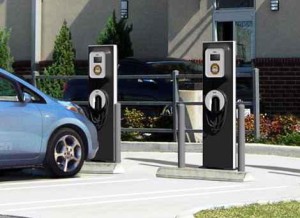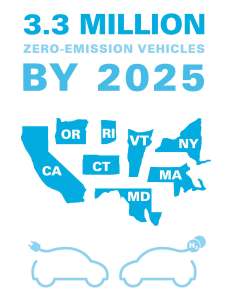Electric vehicles can seem mysterious, and many people have questions about them. Our handy fact and myth guide has all the answers!
Myth #1: Electric cars are glorified golf carts. They may be fine for retirement communities or maintenance staff on college campuses, but they aren’t suitable for everyday driving.
Fact: Neighborhood electric vehicles are indeed useful in retirement communities and on college campuses, but that’s far from the whole story! Over 20 different models of highway-capable electric vehicles (EVs) are already available, and more models are on the way. These electric cars are just as suitable for everyday driving as gas cars.
Myth #2: Electric cars are boring to drive.
Fact: Actually, EVs are especially fun to drive because of their high torque, which enables them to accelerate much more rapidly than gas cars. They also accelerate more smoothly and are much quieter than gas cars. Some high-performance EVs can even beat gas-powered sports cars in a race!
 Myth #3: Electric cars aren’t practical because they have such a short range.
Myth #3: Electric cars aren’t practical because they have such a short range.
Fact: The highest-performing EVs can drive over 200 miles on a single charge, and most EVs can drive at least 80 miles on a single charge. That’s more than twice as far as the average American drives per day. And Connecticut drivers can easily charge their cars while on the road—there are over 300 publicly available charging stations statewide, most of which are free! You can find a map of Connecticut’s public charging stations here.
 Myth #4: Electric cars are actually worse for the environment than gas cars.
Myth #4: Electric cars are actually worse for the environment than gas cars.
Fact: EVs produce no tailpipe emissions, making them much cleaner than gas cars from a local pollution standpoint. But emissions from the fuel used to generate the electricity that EVs run on also must be taken into account. For example, an EV that uses electricity from a coal-fired power plant may be worse from an environmental standpoint than a gas car, while an EV that runs on electricity from solar power would be maximally clean, since it would generate zero emissions. In Connecticut, where we have a relatively low-carbon fuel mix, EVs are more environmentally beneficial than gas cars.
Myth #5: Electric cars cost a fortune and are just toys for the rich.
Fact: Electric vehicles come in a wide range of prices. The most affordable EVs cost under $20,000—comparable to a Ford Focus or a Honda Civic—and used cars can be found for even less. There are also substantial incentives for new EVs. Drivers who purchase new EVs can get a federal tax credit of up to $7,500, and Connecticut offers a state rebate of up to $3,000 for drivers who purchase or lease new EVs. And EVs can save you money over time: In Connecticut, it even costs less to charge an EV than to fuel a gas car. EVs also have lower maintenance costs than gas cars because electric engines are simpler than internal combustion engines.
Myth #6: Connecticut is wasting taxpayers’ money by subsidizing electric cars.
Fact: Connecticut is funding CHEAPR, the state’s rebate program for clean cars, from existing utility merger funds and not from taxpayer dollars. The program launched in May 2015 and as of August, more than 100 state residents have received rebates on their purchases or leases of new clean cars—without costing taxpayers anything.
Sources for the myths and facts can be found here.
